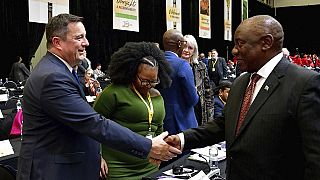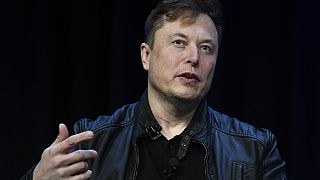South Africa
The daily struggle starts early in Hammanskraal. By 8.30 a.m. there's a queue of South Africans waiting to fill buckets with drinking water from a tank provided by an aid agency.
This is not a distant, rural community, but a settlement on the edge of the capital city of Africa's most advanced economy. It's barely 30 miles from the government buildings in nearby Pretoria.
Hammanskraal's problems — a lack of clean water, a shortage of proper housing and high unemployment — is a snapshot of the issues affecting millions and driving a mood of discontent in South Africa that might force its biggest political change in 30 years in next week's national election.
The African National Congress, once led by Nelson Mandela, has been in power ever since the end of the apartheid system of white minority rule in 1994.
But poverty, failing government services in many places and a sky-high national unemployment rate of 32% that all mainly affect the country's Black majority are seen as central to the ruling party's loss of support.
Recent polls show support for the ruling ANC under 50% — and one as low as 40% — suggesting that it may be in danger of losing its parliamentary majority for the first time.
“I have been voting for 30 years but I don’t see the difference," said Linda Mampuru, who lives in the Hammanskraal neighborhood of Bridgeview.
Mampuru has taken to illegally connecting her water supply to a nearby municipal outlet so she can at least be able to do laundry.
She doesn't trust the supply for drinking or cooking, though.
Hammanskraal also represents the complicated political picture emerging in South Africa.
While many expect the ANC to slip below 50% of the vote amid the frustrations, the main opposition Democratic Alliance is not seen to be gaining significantly from that.
Instead, South Africa's voters are turning to an array of different parties, many of them new, for answers.
There are 70 political parties registered to contest the national election, according to the independent electoral commission.
South Africans vote for political parties in their elections.
Parties then get seats in Parliament according to their share of the vote, and lawmakers elect the president.
The changing political landscape could lead to a coalition government for the first time, bringing a new era.
As people in Hammanskraal trudge up to the water tank to get their daily share, the road is littered with election posters.
Last year, an outbreak of cholera killed more than 30 people after the water-borne disease contaminated the area's supply.













Go to video
Former South African deputy president David Mabuza dies at 64
01:04
South Africa: ANC partner quits key govt initiative as new spat hits coalition
Go to video
African gut study reveals urbanization threatens microbial diversity
01:35
Edgar Lungu's family condemns court decision to stop private burial in South Africa
00:52
South African court halts burial of Zambia’s ex-president Edgar Lungu